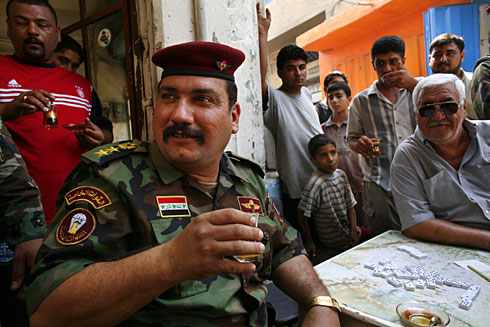 Yes there is good news from Iraq. As always, look to the leaders.
Yes there is good news from Iraq. As always, look to the leaders.BAGHDAD — The Humvee has barely rolled to a stop, and Iraqi army Col. Talib Abdul Razzaq is already out of the vehicle.More please. Many more.
He moves like a politician, stopping on the sidewalk to playfully cuff a young boy on the head and joke with a man selling shoes. He quizzes several people about violence and militias in the neighborhood. Most say the streets have been quiet.
"I'm trying to make people believe in the Iraqi army," Razzaq says at the next stop, where a sidewalk vendor gives him a complimentary sandwich from his cart. "They will feel more safe." Razzaq hands the sandwich to an aide and keeps moving.
Twice a day, Razzaq patrols the troubled neighborhoods in his battalion's sector of Baghdad. He's checking on his troops, who have set up checkpoints in the area. And he's listening to what merchants, local leaders and ordinary people have to say about security in their neighborhoods.
"I am an officer, but my job is like a tribal leader," says Razzaq, who in this polarized society refuses to say whether he is a Shiite Muslim or a Sunni.
...and the first Iraqi division (8th Iraqi Army Division) just got their "safe to solo" papers.
The first full Iraqi Army division will soon be operating without the mentoring of U.S. advisors, a U.S. Army official who oversees Iraqi security forces’ training said Monday in Baghdad....and the view on the ground? This is the Baghdad part of the Baghdad and Borders. Commissar should like it.
Brig. Gen. Dana J.H. Pittard discussed the formation of the Iraqi National Police and security concerns throughout Iraq in a briefing to reporters.
Pittard, commander of the Iraqi Assistance Group, said that after Sept. 3, the 8th Iraqi Army Division will be operating independently.
...
“The Iraqis fight and fight well,” he said. “It’s not the same as it was at all two years ago.”
Pittard credits two factors with these improvements.
“A lot has to do with the hard work of the military transition teams. A lot has to do with the faith they have in the Iraqi government,” he said.
Though large strides have been made, there are still many more to go before U.S. forces can leave.
The general said the overall situation must stabilize, the government of Iraq must be comfortable with its forces, and Baghdad security must improve.
The Iraqi Ministry of Defense reports that the crime rate in Doura has been reduced by 80%. In the Rashid district, Sunni and Shiite political leaders, tribal leaders and imams met and signed an agreement forswearing violence. The tribal leaders went a step further by renouncing protection for tribal members who engage in sectarian violence.
Although it is too early to determine whether these success stories will be replicated throughout the city, this initial progress should give Iraqis, as well as Americans, hope about the future. Contrary to those who portray Iraq as hopelessly mired in ancient ethnic and sectarian feuds, Iraqis themselves want to put the divisions of the
past behind them. The Battle of Baghdad will determine the future of Iraq, which will itself go a long way to determining the future of the world's most vital region. Although much difficult work still remains to be done, it is imperative that we give the Iraqis the time and material support necessary to see this plan through, and to win the Battle of Baghdad.









No comments:
Post a Comment